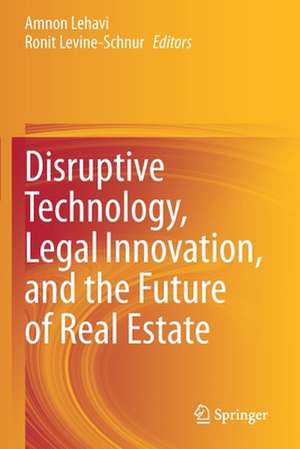Disruptive Technology, Legal Innovation, and the Future of Real Estate
Editat de Amnon Lehavi, Ronit Levine-Schnuren Limba Engleză Paperback – 2 oct 2021
The book is divided into five parts. Part I presents a survey of the current available research on blockchain and real estate. Part II provides a background on property law for the volume, grounding it in fundamental theory. Part III discusses the changing landscapes of property rights while Part IV debates the potential effects of blockchain on land registration. Finally the book concludes with Part V, which is devoted to new technological applications relevant to real estate.
Providing an interdisciplinary perspective on emerging technologies that have the potential to disrupt the real estate industry and the regulation of it, this book will appeal to a broad audience, consisting of scholars, policy-makers, practitioners, and students, interested in real estate, law, economics, blockchain, and technology policy.
| Toate formatele și edițiile | Preț | Express |
|---|---|---|
| Paperback (1) | 686.32 lei 6-8 săpt. | |
| Springer International Publishing – 2 oct 2021 | 686.32 lei 6-8 săpt. | |
| Hardback (1) | 698.15 lei 6-8 săpt. | |
| Springer International Publishing – oct 2020 | 698.15 lei 6-8 săpt. |
Preț: 686.32 lei
Preț vechi: 807.44 lei
-15% Nou
Puncte Express: 1029
Preț estimativ în valută:
131.36€ • 135.37$ • 110.90£
131.36€ • 135.37$ • 110.90£
Carte tipărită la comandă
Livrare economică 03-17 martie
Preluare comenzi: 021 569.72.76
Specificații
ISBN-13: 9783030523893
ISBN-10: 3030523896
Ilustrații: XIII, 181 p. 12 illus., 9 illus. in color.
Dimensiuni: 155 x 235 mm
Greutate: 0.28 kg
Ediția:1st ed. 2020
Editura: Springer International Publishing
Colecția Springer
Locul publicării:Cham, Switzerland
ISBN-10: 3030523896
Ilustrații: XIII, 181 p. 12 illus., 9 illus. in color.
Dimensiuni: 155 x 235 mm
Greutate: 0.28 kg
Ediția:1st ed. 2020
Editura: Springer International Publishing
Colecția Springer
Locul publicării:Cham, Switzerland
Cuprins
Introduction.- Part I- Literature Survey.-1. A Database Exploring Blockchain and Real Estate.- Part II- Theoretical Aspects.- Chapter 2. From Blackstone to Blockchain: Theorizing Property Law in the Age of Cryptography.- Chapter 3. Prospects of Blockchain in Contract and Property.- Part III- Changing Landscapes of Property Rights.- Chapter 4. The Future of Property Rights: Digital Technology in the Real World.- Chapter 5. Social Innovation as a Disruptor of Tenure – Recognising Land Rights of Slum Dwellers in Odisha, India.- Part IV- Land Registration and Blockchain.- Chapter 6. Blockchain-based Land Registries: A Law-and-Economics Perspective.- Chapter 7. Land Registration in the 21st Century: Blockchain Land Registers from a Civil Law Perspective.- Part V- New Technological Applications.-Chapter 8. Selling LAND in Decentraland: The Regime of Non-Fungible Tokens on the Ethereum Blockchain under the Digital Content Directive.- Chapter 9. Application of a Systems Engineering Approach asa Preventative Measure Against Disruptions to Real Estate Institutions.
Notă biografică
Prof. Amnon Lehavi (Yale, J.S.D.) is the Atara Kaufman Professor of Real Estate at the Radzyner School of Law at the Interdisciplinary Centre in Herzliya (Israel), as well as IDC’s Academic Director of the Gazit-Globe Real Estate Institute. He is a leading authority on property, real estate, land use controls, international economic law and law as it pertains to globalization.
Ronit Levine-Schnur is a Senior Lecturer at the Harry Radzyner Law School, and a Research Associate at the Gazit-Globe Real Estate Institute at the Interdisciplinary Center (IDC) Herzliya (Israel). Dr. Levine-Schnur is a lawyer, an urban planner, and a property and land use law expert.
Textul de pe ultima copertă
This book addresses challenges that new technologies and the big data revolution pose to existing regulatory and legal frameworks. The volume discusses issues such as blockchain and its implications for property transactions and taxes, three (or four) dimensional title registration, land use and urban planning in the age of big data, and the future of property rights in light of these changes. The book brings together an interdisciplinary collection of chapters that revolve around the potential influence of disruptive technologies on existing legal norms and the future development of real estate markets.
The book is divided into five parts. Part I presents a survey of the current available research on blockchain and real estate. Part II provides a background on property law for the volume, grounding it in fundamental theory. Part III discusses the changing landscapes of property rights while Part IV debates the potential effects of blockchain on land registration. Finally the book concludes with Part V, which is devoted to new technological applications relevant to real estate.
Providing an interdisciplinary perspective on emerging technologies that have the potential to disrupt the real estate industry and the regulation of it, this book will appeal to a broad audience, consisting of scholars, policy-makers, practitioners, and students, interested in real estate, law, economics, blockchain, and technology policy.
The book is divided into five parts. Part I presents a survey of the current available research on blockchain and real estate. Part II provides a background on property law for the volume, grounding it in fundamental theory. Part III discusses the changing landscapes of property rights while Part IV debates the potential effects of blockchain on land registration. Finally the book concludes with Part V, which is devoted to new technological applications relevant to real estate.
Providing an interdisciplinary perspective on emerging technologies that have the potential to disrupt the real estate industry and the regulation of it, this book will appeal to a broad audience, consisting of scholars, policy-makers, practitioners, and students, interested in real estate, law, economics, blockchain, and technology policy.
Caracteristici
Addresses challenges that new technologies and the big data revolution pose to existing regulatory and legal frameworks Discusses technologies such as blockchain and drones and their implications for property taxes, title registration, land use, and urban planning Provides an interdisciplinary guide to navigating changes to the future development of real estate markets
